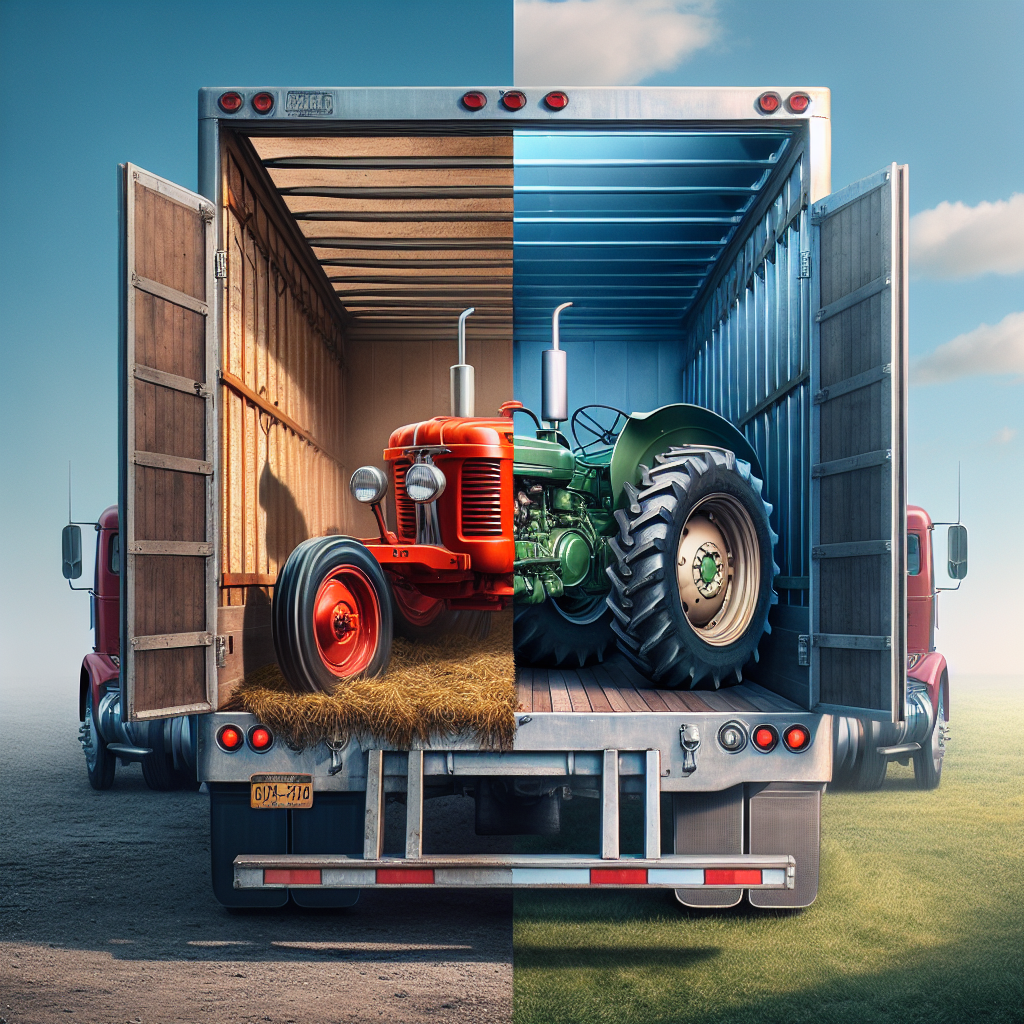Transport Your Tractors with Ease_ A Complete Guide
Published on August 07, 2025
When looking to transport your tractors with ease, it's essential to understand the various options available to ensure the most efficient and cost-effective solution. There are primarily two methods for transporting tractors: open transport and enclosed transport.
1. Open Transport:
Open transport is the most common method used for hauling tractors. It involves loading the tractor onto a flatbed truck or trailer without any covering. While this option is often more economical, it exposes the tractor to the elements, including rain, snow, and road debris. It's ideal for short distances or when time is of the essence.
2. Enclosed Transport:
Enclosed transport offers a protective environment for your tractor. This method uses a fully enclosed trailer, safeguarding the vehicle from weather conditions and potential damage during transit. Although this option may come at a higher price, it is often worth it for valuable or classic tractors, providing peace of mind throughout the transportation process.
Additionally, you may choose between single-tractor transport or multi-tractor transport. Single transport is suitable for those needing to move one vehicle, while multi-tractor transport can be more economical for those with several units to move at once.
Understanding these options will help you make an informed decision that meets your specific needs. If you’re ready to move forward, get a quote today to discover the best transport solution for your tractors.
Preparing Your Tractor for Safe Transport
Proper preparation is crucial for ensuring the safe transport of your tractor. By taking the time to ready your vehicle, you can minimize the risk of damage during transit and ensure a smooth delivery process. Here are some essential steps to follow:
- Clean the Tractor: Start by thoroughly cleaning your tractor. This allows you to inspect it for any existing damage and make necessary repairs. A clean surface will also help the transport company assess the condition of the tractor upon pickup.
- Check Fluid Levels: Ensure that all fluid levels, such as engine oil, coolant, and fuel, are at proper levels. This is particularly important for tractors being transported over long distances.
- Inspect Tires: Check the tire pressure and overall condition of the tires. Properly inflated and maintained tires help prevent issues during loading and transport.
- Secure Loose Parts: Any loose parts or attachments should be secured or removed to prevent them from shifting or falling off during transport. This includes tools, implements, or accessories that could become hazardous.
- Document Condition: Take photos of your tractor from multiple angles before transportation. This documentation can be useful for insurance purposes or in case of any disputes regarding damage during transit.
By following these steps, you can facilitate a safer transportation experience for your tractor. Proper preparation not only protects your investment but also ensures a smooth process from pickup to delivery.
Choosing the Right Transport Service for Tractors

Selecting the right transport service for your tractor is essential to ensure its safety and timely delivery. With numerous options available, it can be overwhelming to make the best choice. Here are some key factors to consider when choosing a transport service:
- Experience and Reputation: Look for a company that specializes in heavy equipment transport, particularly tractors. Research their reputation by reading customer reviews and testimonials. A company with a solid track record is more likely to handle your tractor with care.
- Type of Transport: Decide whether you need open or enclosed transport. Open transport is generally more affordable but exposes the tractor to weather and road debris. Enclosed transport offers better protection, making it ideal for high-value or antique tractors.
- Insurance Coverage: Confirm that the transport service provides adequate insurance coverage for your tractor. This ensures that you are financially protected in case of any damages during transit.
- Pricing Transparency: Request quotes from multiple transport services and ensure that the pricing is transparent. Watch out for hidden fees that could inflate the cost. A reputable company will provide a clear breakdown of charges.
- Customer Support: Choose a transport service that offers excellent customer support. This includes clear communication regarding pickup and delivery schedules, as well as responsiveness to any inquiries or concerns you may have.
By considering these factors, you can confidently select a transport service that meets your needs and ensures the safe transport of your tractor.
Key Safety Tips During Tractor Transport

Transporting a tractor safely requires careful planning and adherence to specific safety protocols. Ensuring the safety of your equipment and the transport vehicle is paramount. Here are some key safety tips to keep in mind during tractor transport:
- Preparation: Before loading your tractor, ensure it is in good working condition. Check fluid levels, tire pressure, and battery status to prevent any mishaps during transport.
- Proper Loading: Use ramps designed for heavy equipment to load the tractor onto the transport vehicle. Ensure that the tractor is centered and balanced to prevent tipping or shifting during transit.
- Secure Fastening: Once loaded, secure the tractor using heavy-duty straps or chains. Make sure to attach the straps to sturdy points on the tractor to avoid any movement during transport.
- Weight Limits: Be aware of the weight limits of the transport vehicle. Overloading can lead to accidents and damage to both the tractor and the transport vehicle.
- Visibility: Ensure that the tractor’s lights are functional and that any additional signage required for oversized loads is clearly displayed. This enhances visibility and safety on the road.
- Route Planning: Plan the transport route in advance. Choose roads that are suitable for heavy equipment and avoid areas with low bridges or tight turns that may pose a risk.
By following these safety tips, you can help ensure that your tractor reaches its destination safely and securely.
Calculating Costs of Tractor Transport Services

When considering tractor transport services, understanding the costs involved can help you budget effectively and avoid unexpected expenses. Several factors contribute to the overall pricing of tractor transport, and being aware of these can lead to a smoother shipping experience. Here are some key elements to consider when calculating the costs of tractor transport services:
- Distance: The distance between the pickup and delivery locations is one of the most significant factors affecting transport costs. Longer distances typically result in higher shipping fees.
- Type of Transport: Choosing between open or enclosed transport can impact the cost. Enclosed transport, while offering more protection, usually comes at a premium compared to open transport.
- Tractor Size and Weight: The size and weight of your tractor play a crucial role in determining the transport cost. Heavier and larger tractors may require specialized equipment, leading to increased expenses.
- Time of Year: Seasonal demand can influence transport rates. During peak seasons, such as harvest time, prices may rise due to higher demand for transport services.
- Additional Services: If you require extra services such as loading assistance, storage, or expedited delivery, these will incur additional charges. Be sure to discuss any specific needs with the transport company.
By taking these factors into account, you can get a clearer picture of the costs associated with tractor transport. It's advisable to obtain quotes from multiple transport providers to ensure you're getting a competitive rate and the services you need.
Frequently Asked Questions About Tractor Transport

When it comes to transporting your tractor, you may have several questions. Understanding the process, costs, and safety measures can help alleviate any concerns you might have. Here are some of the most frequently asked questions regarding tractor transport:
- What is the average cost of tractor transport? The cost can vary widely based on factors such as distance, type of transport, size and weight of the tractor, and additional services required. It's best to request quotes from transport companies for an accurate estimate.
- Do I need to prepare my tractor before transport? Yes, it’s important to prepare your tractor by ensuring it is clean, removing any personal items, and checking fluid levels. This helps prevent damage during transport and ensures a smooth process.
- How long does tractor transport take? Transport time can depend on the distance and route. Typically, local transports may take a few days, while cross-country shipments can take a week or more. Always check with your transport service for estimated delivery times.
- Is my tractor insured during transport? Most reputable transport companies provide insurance coverage during transit. Be sure to clarify the details of the insurance policy and consider purchasing additional coverage if necessary.
- Can I track my tractor during transport? Many transport companies offer tracking services that allow you to monitor your tractor’s journey in real-time. This can provide peace of mind throughout the shipping process.
Having the right information can make your tractor transport experience much easier. If you have more questions or need assistance, get a quote today and let our experts help you with your tractor transport needs!